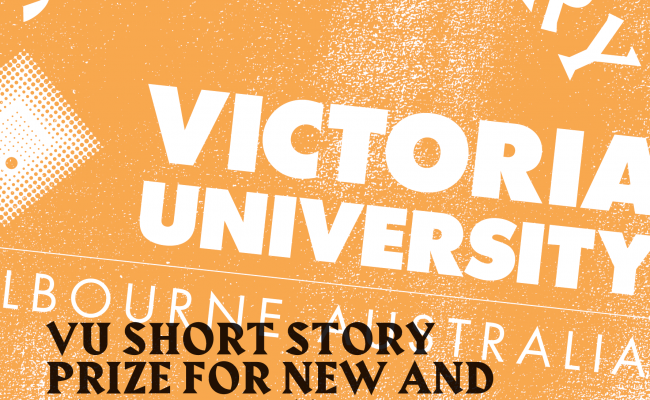Submissions for the 2016 Overland Victoria University Short Story Prize were assessed blind. Five hundred entries were equally divided between the judges, who arrived at a longlist of thirty stories. This longlist was then reduced to a strong shortlist of fourteen, and finally to two runners-up and a winner.
Jennifer Mills
The shortlisted stories took a range of approaches to the short story form and demanded that we examine each one on its own terms. For me, it came down to observing the space between what a story is trying to do and what it achieves, taking into account the creative ambition involved. We were pleased to receive many stories that pushed at boundaries or tried to take a fresh angle to their often dark subject, but innovation for its own sake adds nothing to a story. Form and content don’t need to exist in perfect harmony, but the interaction between them should be considered deeply. The three winners stand out for being interesting, daring and finding a strong connection between ideas and form. These are writers who have asked themselves why their story is the shape it is, in the voice it is, and worked to offer something of real substance to their readers.
Alison Whan
All stories on the shortlist avoided stereotypes, in character and situation. That there wasn’t a repetition of ideas, settings or (limited) female characters made these stories linger and I admit to finding it hard to decide between them.
I’d been reading A Passage to India and thought a lot about it during the judging, because of the idea of writing from life or history, where context and authority are critical. Abused women, for example, should never be a plot device.
One story I’d like to commend is ‘The eviction’: a critique of society that allowed its unusual elderly protagonists to still make choices. A great love story, too.
Jacinda Woodhead
This year’s stories seemed to be filled with illness, death, decaying houses – dsytopian local landscapes from which characters (and the reader) wanted to flee, but from which no escape was offered. Perhaps that’s unsurprising in a world where temperatures keep rising, where war and barbarity are perpetual. But fiction need not be confined to the laws of reality.
Like Alison, I’d say avoid stereotypes. Avoid tokenism. Avoid novel extracts – they have too many loose strands.
Commendations: ‘The road to Amalthea’ and ‘Pigeon’ for their strangeness and ability to strike fear into the heart of this reader.
AS’s ‘The acorn of sadness’ is arch satire, largely told through the relentlessly performative interior monologue of adolescent Ainsley. The voice of this story is perfectly calibrated to its main character’s volatile internal world, capturing the contemporary anxiety of the self as image and the image as self. Ainsley is both sympathetic and ridiculous, tragic and farcical, a victim and a survivor. S has an uncanny ability to dance with these contradictions; she draws comic blood from the blackest of scenes.
Ben Walter’s ‘All hollows’ is a trick-or-treat story that is itself both trick and treat. Walter’s angst-filled character(s), dressed by turns as vampire, werewolf and zombie, emerge from evocative but anonymous landscapes to interact with their potential hosts before withdrawing into an unbreachable solitude. There is a playful nihilism at work in this triptych, as surprising as it is satisfying. The writing is dense, almost overgrown in places, in a way that disorients the reader, but then it soars to ambush us with sudden depths.
This year’s winning story, ‘Broad hatchet’ by Julia Tulloh Harper, is very accomplished, finely wrought and quietly subversive. A pioneer figure takes on the physical challenges of surviving in an Australian landscape. On the surface this may look like the classic Australian short story we’ve been reading since Lawson’s time, but Harper has achieved a clever détournement of a familiar narrative. ‘Broad Hatchet’ is a feminist take on a frontier story that has broken itself open to ask very intimate questions about solitude, independence and self-sufficiency. Harper’s voice is so confident throughout that the reader will follow her anywhere, entering a claustrophobic world of struggle and labour in a landscape both beautiful and hostile. While deeply embedded in the physical, it’s as watchful and patient as it needs to be, withholding judgement, carefully respecting both its protagonist and the reader. Harper shows a sophistication and poise that only come with long and detailed attention. This is a writer who knows what she is doing.
The winning stories are pioneering in spirit and style. Using very different methods, these stories examine what it means to be human, to surpass expectations, to conquer, to fail. All three demand the reader’s attention in surprising ways, and each of them honours the gift of a story by trusting their readers to draw their own meaning from it. We’re proud to introduce these stories and writers to Overland readers.
Read the rest of Overland 224
If you like Overland’s support of new writers,
buy the issue
Or subscribe and receive four outstanding issues for a year


